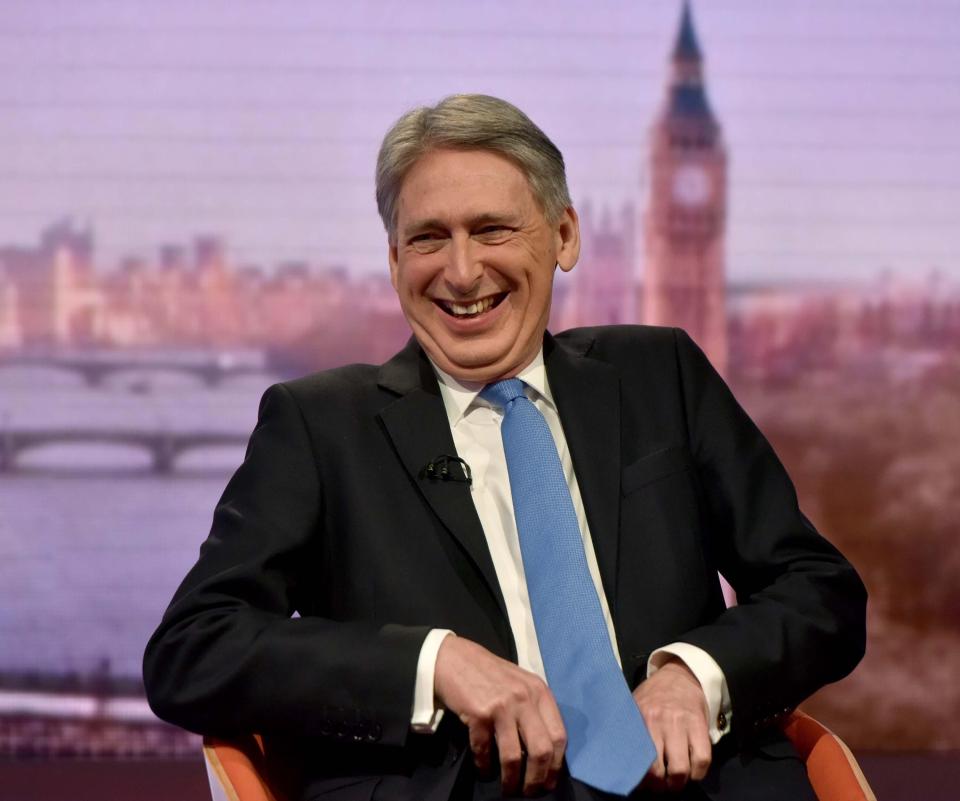Low-income families just £4 better off per week due to Universal Credit changes
Senior Tories are urging Philip Hammond to help struggling workers after it emerged that many are hardly better off since the Conservatives came into power in 2010

PHILIP Hammond is being urged by senior Tories to help struggling workers after it emerged many are just £4 a week better off than in 2010.
The Chancellor will unveil a small upturn in the nation’s finances at his Spring Statement on Tuesday.
But research by the Joseph Rowntree Foundation revealed the poorest fifth of working households have barely benefited since the Tories came to power eight years ago.
The cost of living plus welfare cuts have actually left many worse off in real terms.
In contrast, the middle fifth of earners are £16 a week better off.
Mr Hammond was urged to use his £10bn windfall to return cash raided from the Universal Credit budget.
It would cost £2bn a year to restore the “work allowance” — increasing the amount kept before claimants lose benefits.
It would help three million Brits and take 340,000 out of poverty, including 310,000 families.
Tory MP Iain Duncan Smith introduced the Universal Credit system in 2010, but dramatically quit his job after the programme was cut by around £3.4billion under Chancellor George Osborne five years later.
He said: “The whole point of Universal Credit is to entice people back into work.
“The more money we’re able to offer people to do that, the more successful we will be.”
Backbencher Johnny Mercer added: “We have a duty to help the poorest in society who are trying to do the right thing.”
MOST READ IN POLITICS
JRF chief Campbell Robb said: “In-work poverty is the problem of our times.
"His economic update must address the challenges facing families struggling to cover rent or put food on the table.”
Mr Hammond said any extra cash should be used to reduce the national deficit.
What is Universal Credit?
Universal Credit is a new benefit that is being rolled out across the UK, aimed at simplifying the welfare system by replacing different benefits like jobseeker's allowance or housing benefit with a single monthly payment.
The Government had said that three million working households would see cash gains from Universal Credit.
Treasury officials said a couple with two children where one parent earns £30,000 a year would benefit by £425.
A single parent with one child and no housing costs earning £15,000 a year will get £170 more, officials claimed.
These differences are due to a change in something called the taper rate, which came into effect in November 2017.
Universal Credit will replace the following benefits:
- Child Tax Credit
- Housing Benefit
- Income Support
- income-based Jobseeker’s Allowance (JSA)
- income-related Employment and Support Allowance (ESA)
- Working Tax Credit
If you currently receive any of these benefits, you can’t claim at the same time.
Who can claim Universal Credit?
CURRENTLY, Universal Credit is mainly claimed by the unemployed, or those earning less than £338 a month.
But the benefit will replace jobseeker’s allowance, employment and support allowance, income support, working tax credit, child tax credit and housing benefit by March 2022.
Universal Credit has previously been criticised for lengthy delays to benefit payments, with a third of families having to wait six weeks for their first instalments.
However, Chancellor Philip Hammond announced in the Autumn Budget that the government would pour £1.5 billion into reducing the waiting time by seven days.
Roll-out of the Government's flagship welfare reform programme is expected to take place in 50 job centres.
By 2022, it is expected there will be a full roll out across the UK.
For information about whether you can claim, visit .
What is the taper rate?
The government plans to put cash back in the pockets of working families by lowering the all-in-one benefit’s taper rate from 65 per cent to 63 per cent.
The taper rate is the amount of money that gets deducted from your benefits when you earn over a certain amount.
So before, everyone earning above a certain threshold from their job would lose 65p from every pound of benefits cash they were able to claim over that amount.
But now, workers will lose just 63p - 2p less - for every pound they earn above their work allowance.
The work allowance is set at £192 a month - or £397 a month if you don't receive help with housing costs - meaning it amounts to either £2,304 or £4,764 a year.
We pay for your stories! Do you have a story for The Sun Online Money team? Email us at money@the-sun.co.uk or call 0207 78 24516. Don't forget to join the for the latest bargains and money-saving advice.













